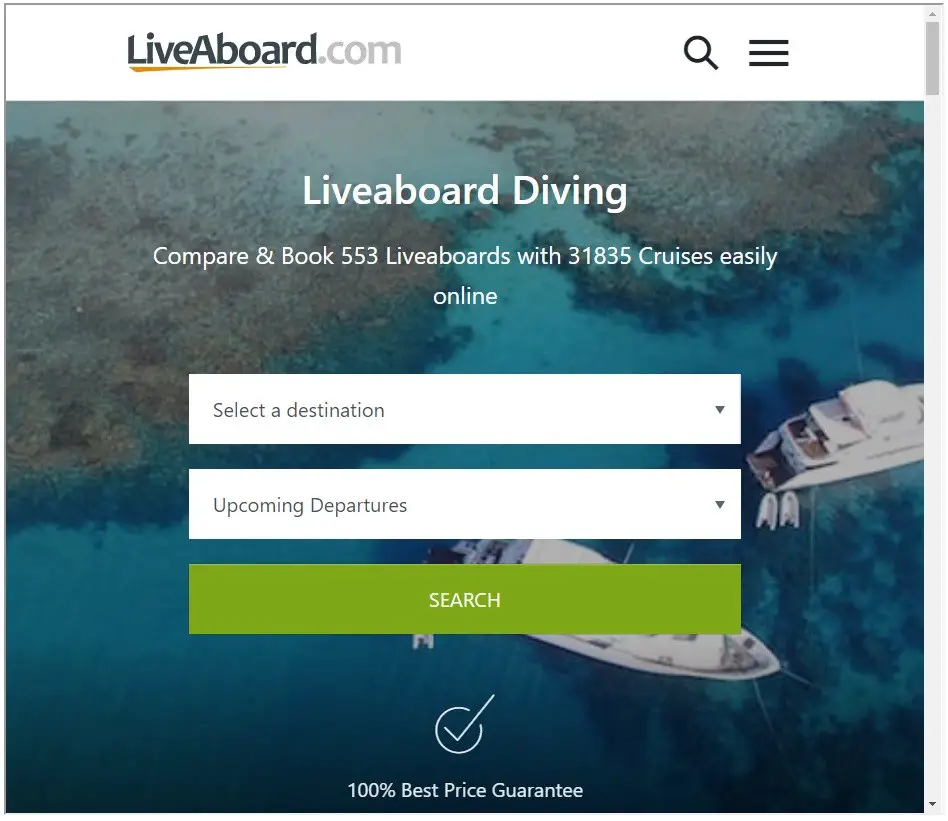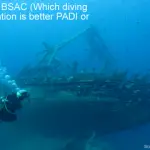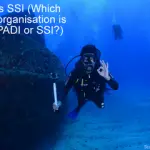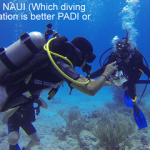
How deep can you dive with an open water certification?
An open water certification is the first level of scuba diver qualification for many of the scuba diving organisations. This is what gets you into scuba diving.
The depth you can you dive with an ‘Open Water Diver‘ certification is 18 metres (60 feet) with diving organisations like PADI and SSI. Get scuba certified to ‘Advanced Open Water Diver‘ (AOWD) and dive to 30 metres (100 feet). Other diving organisations also refer to their first scuba certification level as ‘Open Water Diver‘. Some use the 18 metres depth level, whereas others use 20 metres (66 feet) as they’re safe depth for newly certified scuba divers. BSAC’s first certification level is ‘Ocean Diver‘, with a depth limit of 20 metres.
The best way to do more diving is to book yourself on a scuba diving liveaboard. You can check the latest and best deals on liveaboards using the following window:
Why is depth important for scuba divers?
Before I answer the question ‘How deep can you dive with an open water certification,’ I want to explain why depth is important for scuba divers.
When you’re a beginner scuba diver take your time to build up your experience before you progress to the next certification level. Dive at least 20-30 dives before you worry about going deeper than you can at Open Water Diver level.
Also, it’s important to know why beginner scuba divers are restricted to certain depths, like 18-20 metres (60-66 feet).
There are a few things that are important when it comes to going deeper underwater, which include:
- The deeper you go, the more air you consume.
- When you consume more air as you go deeper, your air will run out more quickly.
- The deeper you go the fast the build up of nitrogen in your body and tissues.
- The more nitrogen you have in your body and tissues, the longer you need to decompress as you ascend.
- The deeper you go and the longer you spend at depth, the more chance you have of going into a decompression stop dive scenario.
- Once you go beyond 30 or so metres (100 feet), the more chance there is of getting nitrogen narcosis.
- As you go deeper, you become heavier and you need to compensate for this with more buoyancy in your buoyancy control device.
I don’t tell you this to worry you. I also don’t want to put you off scuba diving either. But I tell you this for your safety and enjoyment. Scuba diving is a dangerous sport, but it’s also an enjoyable sport. If the water is respected and you dive using safe diving practices, you will be safe.
Always take your time when you’re learning to scuba dive. Build up your experience by diving as much as possible before moving on to the next certification level.

How deep can you dive with an open water certification?
The depth you can dive with an open water certification depends on the diving organisation. Here’s a list of the organisations that use the term ‘open water diver,’ for their first level of scuba diver certification:
- PADI – A PADI Open Water Diver can dive to a depth of 18 metres (60 feet).
- SAA – An SAA Open Water Diver can dive to a depth of 18 metres (60 feet).
- SSI – An SSI Open Water Diver can dive to a depth of 18 metres (60 feet).
- SDI – An SDI Open Water Scuba Diver can dive to a depth of 20 metres (66 feet).
- IANTD – An IANTD Open Water Diver can dive to a depth of 21 metres (69 feet).
- PSS – A PSS Open Water Diver can dive to a depth of 18 metres (60 feet).
The equivalent qualification for BSAC is an Ocean Diver. A BSAC Ocean Diver can dive to a depth of 20 metres (66 feet).
The equivalent for NAUI is the ‘Scuba Diver.’ A NAUI Scuba Diver can dive to a depth of 18 metres (60 feet).
More Reading: PADI vs BSAC (Which diving qualification is better PADI or BSAC?)
How many dives do you need for open water certification?
The number of dives you need for an open water certification also depends on the scuba diving organisation too.
For example, with PADI you are required to complete five dives for your open water certification.
Three of the dives need to be in confined waters. Two of the five dives need to be in open water.
For BSAC this is a total of at least nine dives to become an Ocean Diver.
BSAC training has always been more rigorous than PADI, in fact it used to be even more rigorous back when I learn to to dive than it is now.
To become a certified Ocean Diver with BSAC you need to complete at least five sessions in a pool or in sheltered water. This is followed by at least four open water dives.
SSI requires you to do six pool sessions or confined water sessions, followed by four open water dives.
More Reading: PADI vs SSI vs NAUI vs BSAC (Differences & is one certification better?)
How much does it cost to get certified in scuba diving?
How much it costs to get certified in scuba diving is not an easy question to answer.
The cost of training depends on which organisation you decide to train with. Plus it depends on where in the world you decide to train.
The best approach is to decide where you want to do your scuba diver training. Once you’ve decided on this, find out from the nearest dive centre to where you want to train, how much it costs.
However, to give you an idea of cost, you are probably looking at somewhere between $350-$500 for the training.
This cost is aside from the travel and accommodation or hotel costs, if you decide to get certified on vacation.
But if you find a local diving school near you, this will keep the cost down.
How long does it take to get certified as a scuba diver?
The time it takes to get certified as a scuba diver partly depends on you, but it also depends on which diving organisation you train with.
The number of training dives varies from one diving organisation to the next, as noted above.
For example, BSAC requires ‘at least‘ five pool or sheltered sessions. The ‘at least’ bit is dependent on you and how well you adapt to the training.
For example, when I used to teach diving there would be some students who took longer to master the mask clearing part.
Whereas others would get it right away. I would spend as much time as was necessary to help my students through any difficulties they had. This of course added to the time the training takes.
Having said that, you are looking at somewhere between 2-5 days of training depending on how many dives can be done on each day. This also takes account of the theory lessons and exam.
I hope you enjoyed this article about how deep can you dive with an open water certification?
I’d love to hear from you. Tell us about your adventures of diving and snorkeling, in the comments below. Please also share your photos. Either from your underwater cameras or videos from your waterproof Gopro’s!
If this article hasn’t answered all of your questions. If you have more questions either about snorkeling or scuba diving (or specifically about how deep can you dive with an open water certification?), please comment below with your questions.
There will also be many more articles about scuba diving (and snorkeling) for you to read and learn about these fabulous sports.
Have fun and be safe!




